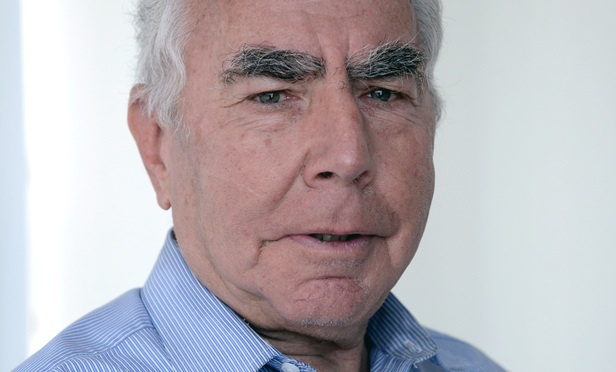Martin A Schwartz

October 29, 2018 | New York Law Journal
Section 1983 Taser Cases (Part I)In his Section 1983 Litigation column, Martin A. Schwartz describes how Tasers operate and reviews the general Fourth Amendment and qualified immunity principles governing §1983 excessive force claims.
By Professor Martin A. Schwartz
13 minute read

August 31, 2018 | New York Law Journal
First Amendment Retaliatory Arrest Claims: A Look at ' Lozman'In his Section 1983 Litigation column, Martin A. Schwartz notes that probable cause is a complete defense to a § 1983 Fourth Amendment false arrest claim. But is it also a complete defense to a § 1983 First Amendment retaliatory arrest claim?
By Martin A. Schwartz
12 minute read

July 02, 2018 | New York Law Journal
Qualified Immunity Shields Officer From Deadly Force Claim in 'Kisela'In his Section 1983 Litigation column, Martin A. Schwartz notes that qualified immunity has recently come under attack by prominent federal jurists and legal scholars.
By Martin A. Schwartz
4 minute read

April 30, 2018 | New York Law Journal
Municipal Custom and PracticesIn his Section 1983 Litigation column, Martin A. Schwartz analyzes “custom or practice” municipal liability. He explains the importance of this issue, explores the meaning of “custom and practice,” and identifies the types of evidence that may be admissible to prove a municipal custom or practice.
By Martin A. Schwartz
13 minute read

March 05, 2018 | New York Law Journal
Takeaways From the 'Bachelor Party' Case: 'District of Columbia v. Wesby'In his Section 1983 Litigation column, Martin A. Schwartz discusses the recent decision in 'District of Columbia v. Wesby', in which the U.S. Supreme Court articulates several important Fourth Amendment and qualified immunity principles.
By Martin A. Schwartz
14 minute read

November 02, 2017 | New York Law Journal
Supreme Court Immunization of Prosecutorial MisconductIn his Section 1983 Litigation column, Martin A. Schwartz explains how a series of decisions by the U.S. Supreme Court has brought us to the point that even the most blatantly unconstitutional conduct by prosecutors is frequently not redressable under §1983.
By Martin A. Schwartz
27 minute read

September 14, 2017 | New York Law Journal
The Absolute Immunity of Police Officer WitnessesIn his Section 1983 Litigation column, Martin A. Schwartz writes: For a §1983 claim based upon a law enforcement officer's perjurious testimony to succeed, the plaintiff will have to overcome the officer's absolute witness immunity, which applies regardless of how malevolent the officer's wrongdoing, or how injurious it was to the arrestee, and even if it caused a wrongful conviction.
By Martin A. Schwartz
11 minute read

July 10, 2017 | New York Law Journal
SCOTUS Rejects Excessive Force 'Provocation' Doctrine, Invokes Proximate CauseIn his Section 1983 Litigation column, Martin A. Schwartz writes that the U.S. Supreme Court recently overturned the Ninth Circuit's "provocation doctrine" on the ground that it was inconsistent with Fourth Amendment excessive force jurisprudence. The court held that whether officers who conduct an unconstitutional search are liable for injuries from their subsequent use of force depends upon the application of traditional proximate cause principles—but applying proximate causation in these circumstances is easier said than done.
By Martin A. Schwartz
11 minute read
June 27, 2017 | Daily Business Review
The Window May Be Closing for Condominium TerminationsSince changes in the termination statute in 2007 permitting optional terminations, several hundred condominiums have been terminated in Florida. Most of these were as a result of the Great Recession where many condominium conversions, from rental apartments to condominiums, were reverted to rentals by terminations, writes Martin A. Schwartz.
By Commentary by Martin A. Schwartz
4 minute read

May 23, 2017 | New York Law Journal
SCOTUS Upholds Pretrial Detention Seizure Claim, Sidesteps 'Malicious Prosecution'Section 1983 Litigation columnist Martin A. Schwartz writes that the U.S. Supreme Court recently held that an arrestee's §1983 Fourth Amendment unreasonable seizure claim may challenge his pretrial detention, including detention after the issuance of legal process, such as a judicial determination of probable cause. The court, however, sidestepped the major issue of whether a §1983 malicious prosecution claim can be premised on a violation of Fourth Amendment rights.
By Martin A. Schwartz
25 minute read
Trending Stories
- 1Gibson Dunn Sued By Crypto Client After Lateral Hire Causes Conflict of Interest
- 2Trump's Solicitor General Expected to 'Flip' Prelogar's Positions at Supreme Court
- 3Pharmacy Lawyers See Promise in NY Regulator's Curbs on PBM Industry
- 4Outgoing USPTO Director Kathi Vidal: ‘We All Want the Country to Be in a Better Place’
- 5Supreme Court Will Review Constitutionality Of FCC's Universal Service Fund
More from ALM
- Legal Speak at General Counsel Conference East 2024: Match Group's Katie Dugan & Herrick's Carol Goodman 1 minute read
- Legal Speak at General Counsel Conference East 2024: Eric Wall, Executive VP, Syllo 1 minute read
- Legal Speak at General Counsel Conference East 2024: Virginia Griffith, Director of Business Development at OutsideGC 1 minute read



